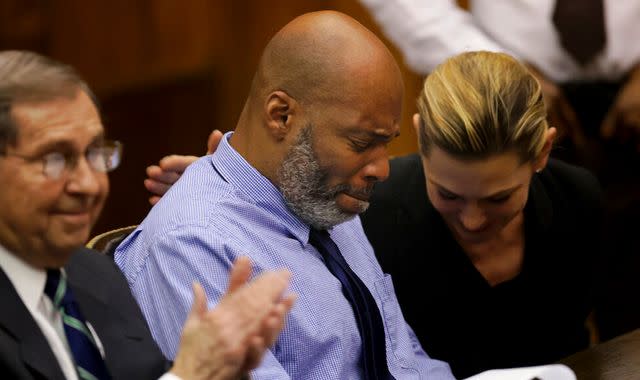Lamar Johnson: Father, 50, has murder conviction overturned after serving nearly 28 years of life sentence

A 50-year-old man has had his conviction overturned after serving nearly 28 years of a life sentence for a murder he always maintained he didn't commit.
Lamar Johnson closed his eyes and shook his head slightly as a member of his legal team patted him on the back when the judge issued the ruling.
Mr Johnson was convicted of murder for the October 1994 killing of Marcus Boyd, who was shot to death on his front porch by two masked men in St Louis, Missouri.
The case for his release was centred around a key witness who recanted his testimony and a prison inmate who admitted it was he - not Mr Johnson - who was the second man involved in the killing.
Circuit Judge David Mason explained that in order to come to his decision there had to be "reliable evidence of actual innocence - evidence so reliable that it actually passes the standard of clear and convincing".
The father was beaming as he walked free from the St Louis courthouse on Tuesday.
He walked up to reporters in the courthouse lobby about two hours after the ruling and thanked everyone who worked on his case, as well as the judge.
"This is unbelievable," said Mr Johnson, who didn't take any questions.
He now plans to reconnect with his family and enjoy experiences he was denied for most of his adult life while locked up, his lawyers said.
"While today brings joy, nothing can restore all that the state stole from him. Nothing will give him back the nearly three decades he lost while separated from his daughters and family," his lawyers added.
"The evidence that proved his innocence was available at his trial, but it was kept hidden or ignored by those who saw no value in the lives of two young black men from the South Side."
Republican-led office tried to keep Johnson behind bars
St Louis Circuit Attorney Kim Gardner had filed a motion in August seeking Mr Johnson's release after an investigation her office conducted with help from the Innocence Project convinced her he was telling the truth
She applauded the ruling and said before the gathered press: "Mr Lamar Johnson. Thank you. You're free."
The Republican-led state attorney general's office had fought to keep Mr Johnson locked up.
Madeline Sieren, a spokeswoman for the office, has said it will take no further action in the case but defended the push to keep him behind bars.
"As he stated when he was sworn in, Attorney General (Andrew) Bailey is committed to enforcing the laws as written," Ms Sieren wrote.
"Our office defended the rule of law and worked to uphold the original verdict that a jury of Johnson's peers deemed to be appropriate based on the facts presented at trial."
Mr Johnson's attorneys blasted the state attorney general's office after the hearing, saying it "never stopped claiming Lamar was guilty and was comfortable to have him languish and die in prison".
'It would have been impossible for Johnson to carry out killing'
Police and prosecutors blamed the 1994 killing on a dispute over drug money.
Mr Johnson maintained his innocence from the outset, saying he was with his girlfriend miles away when the crime occurred.
While Mr Johnson was convicted and sentenced to life, a second suspect, Phil Campbell, pleaded guilty to a reduced charge in exchange for a seven-year prison term.
Mr Johnson testified at a December hearing that he was with his girlfriend on the night of the crime, except for a few minutes when he stepped outside of the home of a friend to sell drugs on a corner several blocks from where the victim was killed.
Mr Johnson's girlfriend at the time, Erika Barrow, testified that she was with him that entire night, except for about a five-minute span when he left to make the drug sale.
She said the distance between the friend's home and Mr Boyd's home would have made it impossible for Mr Johnson to get there and back in five minutes.
Read more US news
University gunman 'may have planned school attacks'
Alleged murderer attacks her own lawyer
Witness felt 'bullied' by police
James Howard, who is serving a life sentence for murder and several other crimes, testified at the December hearing that he and Campbell decided to rob Mr Boyd.
He said Mr Boyd owed one of their friends money from the sale of drugs.
The 46-year-old also said Mr Johnson wasn't there at the time of the killing.
Howard testified that he shot Mr Boyd in the back of the head and neck and that Campbell shot him in the side.
Meanwhile, a witness named James Elking testified in December that he was on the front porch with Mr Boyd trying to buy crack cocaine when the two gunmen launched the attack.
Mr Elking said he named Mr Johnson as one of the shooters after feeling "bullied" and "pressured" by police.
Mr Elking was also paid at least $4,000 (£3,300) after agreeing to testify, the court heard.
"It's been haunting me," he said of his role in sending Mr Johnson to prison.

 Yahoo News
Yahoo News 
